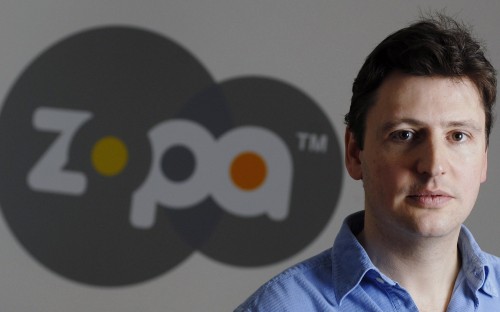Growing number of b-school start-ups in fast-expanding financial technology market.
A gaggle of business school graduates is among the growing number of start-up entrepreneurs hoping to electrify the fast-growing peer-to-peer lending market.The P2P industry has risen prominence over the past two years, with more than £500 million being lent to individuals and businesses in the second quarter of this year alone.
Market leaders such as Zopa, which pioneered online direct lending, and which was founded by INSEAD business school graduate Giles Andrews, are jostling with niche platforms focusing on areas such as real estate and invoice financing.
Nearly 300 P2P businesses have sought full or partial permission to operate from the Financial Conduct Authority since the UK regulator began overseeing the sector last year, according to new figures from Bovill, the regulatory consultancy.
Amid the financial technology, or fintech, frenzy MBA graduates are leading innovation in P2P. Business school start-ups in the industry include US based crowdfunding site Indiegogo, founded by Haas School MBA Danae Ringelmann, and cash transfer platform WorldRemit, founded by London Business School graduate Ismail Ahmed.
The P2P industry is coming of age, confirmed by the floatation last year of Lending Club, the Silicon Valley based platform founded by Renaud Laplanche, who studied at HEC Paris, a leading French business school.
The Peer-to-Peer Finance Association, a trade body, forecasts that lending will exceed £2.5 billion in the UK in 2015. The US is by far the biggest market, with P2P lenders there having already raised more than $8 billion for their users.
The largest P2P lenders focus on matching borrowers with investors, such SoFi, a student loan specialist which was set-up by Stanford GSB MBA Michael Cagney. Since its foundation in 2011, the company has raised more than $750 million in venture capital.
In June SoFi said it had hit the $3 billion mark in loans funded through its platform. Chief executive Michael, said the milestone is a testament to the company’s ability to cater to professionals who have been “repeatedly overlooked by traditional financial institutions”.
Other P2P platforms have focused on equity funding, targeting start-up businesses that need seed and growth capital.
Goncalo de Vasconcelos founded SyndicateRoom, an investor-led equity platform, the same year he graduated from the MBA at Cambridge Judge Business School in the UK. The platform has helped raise more than £31 million since its launch in 2012.
Goncalo said SyndicateRoom’s vision is that for every pound invested, everybody makes or loses the same amount of money. “Equity crowdfunding is a beautiful thing — it helps entrepreneurs raise finance in a more efficient way, but it has to work for investors for it to be sustainable,” he said.
Goncalo believes that his MBA has been of benefit to SyndicateRoom, which was named after a study area at Cambridge Judge.
“It gives you that credibility. It opens doors,” he said, while also providing a boost to confidence. Goncalo also values his MBA network. “Everyone wants to chip in with ideas. We had really valuable feedback,” he added.
Ayan Mitra, the founder and chief executive of CrowdBnk, an equity and structured debt crowdfunding platform, said that his MBA network has come in handy. “People back each other,” he said.
An MBA also spurred him to begin his entrepreneurial journey. “It changes your outlook towards life,” he said of the degree he earned at London Business School. Since its launch in 2013, CrowdBnk has helped users raise £17 million in funding.
P2P lenders emerged as challengers to traditional lenders, which are seen as slow moving and lacking in innovation, although many P2P platforms have since partnered with banks.
Ayan said that the P2P market will “disrupt” traditional lenders: “Alternative finance platforms are here to stay.”
Increasingly, industry leaders such as Transferwise, also founded by an INSEAD alumnus, are being joined by specialist online marketplaces. One such venture is We Are Pop Up, a digital marketplace for short-term retail property, founded in 2012 by Nicholas Russell, a graduate of Oxford University’s Saïd Business School.
Styled as an alternative to commercial property agents, the company has signed up “hundreds” of landlords, and has raised $2.7 million in venture capital.
Nicholas, CEO, is riding a “power shift” away from commercial landlords to consumers.
“When we went through our accelerator program two years ago people didn’t even know what proptech was,” he said in reference to the nascent property-tech market. “Where we are [now] is really exciting,” he said.
Student Reviews
Cultural experience
I have met the most competent and diverse batch in this school. These people not only thrive on their own but also makes sure that you are doing it with them. The professors will take your had and walk you through all milestones and make sure you are not left behind. I have found their extracurriculars extremely engaging. There was always a room to have social life after academic life. The only hindrance is the location of the school, it is slightly outside city and living in city is expensive.
Internationality and diversity of opportunities
About my programme I would say it is very international and flexible: we have the opportunity to choose exactly the courses we want. But at the same time, the frame of the campus is crucial in students' life and enable us to create friendships.
Great selection of people
While HEC's MBA is highly selective, I really enjoy the type of people HEC's selects to make sure everybody gets the best out of their MBA experience and networking opportunities. Not only it's an incredibly diverse pool of people (~60 nationalities) but most importantly they make sure to let in friendly empathic and curious people.
Best in France for Grande ecole
A prestigious business school. Languages are important. It is better to have a scientific baccalaureate with excellent grades in high school and good assessments.
The courses are well designed as per the latest trends and practicality of learning in stressed upon. Overall, a very good experience.
Diversity and quality of fellow students
Very international and interesting place to be and opens a lot of opportunities, however the administration is very french and facilities are subpar (gym, classrooms) meaning the academic affairs is pretty much useless and lastly we are graded on a curve which can create a toxic environment because of the competition. With that being said the pros outweighs the cons by far.
The quality of the teachers, the campus, the clubs
The school is very international indeed, we have courses with international students and share things with them within the extra academic life (in the social clubs especially). We have great career prospects if we prepare ourselves well - however, the global curriculum is still very finance-oriented, which is a pity for other interesting domains of the company world, which does not rely on finance only. The social clubs are good practice for the management and for now, are quite independent.
HEC Paris awaits you
HEC Paris is really a nice place to do a master's in business. Many classes are useful and interesting (corporate finance, financial accounting, contract law…), some are less - but the curriculum is to be reviewed in the year to come. Regarding the student life, it is incredible, with about 130 clubs, lots of great parties with even greater people. The Jouy campus offers a lot of opportunities to do sports, and you can breathe fresh air every day. HEC also helps a great deal to find an internship or a job.
A dream institute
Enrolling in the HEC MBA was by far the best decision I made for myself. The people and faculty are great, with lots of opportunities to meet people and expand your horizons. Very nice campus where I have had some good running sessions.
The alumni network is superb and very helpful. It also has a good support system for entrepreneurs. Would definitely recommend it!
Good choice for a career boost
The classes were extremely practical and relevant to the current challenges that businesses are facing. You have access to a wide range of professionals and good career prospects once you leave the university.
Cultural experience
I have met the most competent and diverse batch in this school. These people not only thrive on their own but also makes sure that you are doing it with them. The professors will take your had and walk you through all milestones and make sure you are not left behind. I have found their extracurriculars extremely engaging. There was always a room to have social life after academic life. The only hindrance is the location of the school, it is slightly outside city and living in city is expensive.
Internationality and diversity of opportunities
About my programme I would say it is very international and flexible: we have the opportunity to choose exactly the courses we want. But at the same time, the frame of the campus is crucial in students' life and enable us to create friendships.
Great selection of people
While HEC's MBA is highly selective, I really enjoy the type of people HEC's selects to make sure everybody gets the best out of their MBA experience and networking opportunities. Not only it's an incredibly diverse pool of people (~60 nationalities) but most importantly they make sure to let in friendly empathic and curious people.
Best in France for Grande ecole
A prestigious business school. Languages are important. It is better to have a scientific baccalaureate with excellent grades in high school and good assessments.
The courses are well designed as per the latest trends and practicality of learning in stressed upon. Overall, a very good experience.
Diversity and quality of fellow students
Very international and interesting place to be and opens a lot of opportunities, however the administration is very french and facilities are subpar (gym, classrooms) meaning the academic affairs is pretty much useless and lastly we are graded on a curve which can create a toxic environment because of the competition. With that being said the pros outweighs the cons by far.
The quality of the teachers, the campus, the clubs
The school is very international indeed, we have courses with international students and share things with them within the extra academic life (in the social clubs especially). We have great career prospects if we prepare ourselves well - however, the global curriculum is still very finance-oriented, which is a pity for other interesting domains of the company world, which does not rely on finance only. The social clubs are good practice for the management and for now, are quite independent.
HEC Paris awaits you
HEC Paris is really a nice place to do a master's in business. Many classes are useful and interesting (corporate finance, financial accounting, contract law…), some are less - but the curriculum is to be reviewed in the year to come. Regarding the student life, it is incredible, with about 130 clubs, lots of great parties with even greater people. The Jouy campus offers a lot of opportunities to do sports, and you can breathe fresh air every day. HEC also helps a great deal to find an internship or a job.
A dream institute
Enrolling in the HEC MBA was by far the best decision I made for myself. The people and faculty are great, with lots of opportunities to meet people and expand your horizons. Very nice campus where I have had some good running sessions.
The alumni network is superb and very helpful. It also has a good support system for entrepreneurs. Would definitely recommend it!
Good choice for a career boost
The classes were extremely practical and relevant to the current challenges that businesses are facing. You have access to a wide range of professionals and good career prospects once you leave the university.
Diverse
HEC, as an academic institution, serves as a launching pad for students to excel in their pursuits and careers. The diversity among students and professors is truly remarkable. The chance to attend seminars across five major continents is unparalleled. The exposure and relationships it fosters are invaluable.
Super diverse
It's a super diverse and fascinating environment with tons of chances, but the management is very French, and the facilities like the gym and classrooms are not great. This makes the academic side quite ineffective. Plus, we're graded on a curve, leading to a competitive and sometimes toxic atmosphere. Despite all that, the benefits definitely overshadow the drawbacks.
Surreal academic experience
What stood out to me about HEC was the direction and insight it offered on coding approaches. Prior to joining the program, I attempted self-learning, but I felt disoriented and lacked a starting point.HEC enabled me to grasp the basics of programming and provided support when I encountered obstacles. Without that guidance, I doubt I would have achieved the progress I have made to date.
Good security
HEC boasts a dedicated team of security personnel who undergo rigorous training to ensure the perpetual maintenance of tranquility and orderliness within the institution. Their unwavering efforts are directed towards fostering a sense of security among the student body, thereby enabling them to channel their energies predominantly towards their academic pursuits.
Innovative teaching method
I am thoroughly enjoying my time at HEC, from the innovative teaching methods to the welcoming campus environment, which is particularly supportive of international students. The extracurricular opportunities, such as sports and associations, are incredibly valuable. Additionally, the career services offered are exceptional. Overall, I find my experience at HEC to be truly enriching.
mim
HEC Paris has been a transformative experience for me. The caliber of the faculty, the diversity of the student body, and the global network it offers are unmatched. The curriculum is highly flexible, allowing students to tailor their learning experience to their career goals, and the focus on real-world application through case studies and consulting projects provides invaluable hands-on experience. The campus itself is beautiful, and the opportunities to engage with leading companies through internships, competitions, and networking events have been incredible. HEC truly prepares you to be a leader in today's complex business world. I couldn’t have asked for a better program to propel my career forward.
Unwavering enthusiasm
Here's the first paragraph:
I embarked on a journey to Paris, where HEC University welcomed me with open arms. As I stepped onto its prestigious campus, I was captivated by the infectious energy and innovative spirit that filled the air. The passionate faculty, industry experts, and fellow visionaries from around the globe shared their knowledge with unwavering enthusiasm."
Exceptional Experience
HEC offers an exceptional experience that I highly recommend. The small-town setting allows for a unique blend of academic rigor and community engagement. The peaceful campus and close-knit student body create a warm environment. Proactive engagement with professors yields valuable guidance. Friendships may blossom slowly, but persistence pays off. The city's beauty, scenic views, and diverse eateries near campus enrich the experience. University dining may not impress, but it's decent.
A Transformative Experience
Attending HEC Paris is an exceptional experience, combining world-class education with personal and professional growth opportunities.
The courses are incredibly engaging, delivered by highly qualified professionals who are specialists in their domains and often work or have work experience in prestigious companies. Far from being purely theoretical, the programs emphasise practical, hands-on learning, allowing students to dive deep into whichever area they want to specialise in. The variety of elective courses is remarkable - you can explore anything from advanced financial techniques to more cultural disciplines like politics, arts, and cinema.
Beyond academics, the student life at HEC is vibrant and dynamic. With over 50 student associations to join, there's something that will fit for everyone. Whether you are passionate about entrepreneurship, sports, arts, cuisine, social causes or anything else, HEC offers a space to explore and develop your interests.
The campus itself is well-equipped, providing students with everything they need for a comfortable and enriching experience. From excellent accommodations and sports facilities with professional coaching to a sprawling green area perfect for walking or relaxing, the environment is both stimulating and tranquil. And with Paris just a short bus ride away, students have the added benefit of easy access to one of the world's most beautiful cities.
However, what truly sets HEC apart is the unparalleled networking opportunities it provides. The school fosters connections through daily conferences in various fields of business (and not only business), networking events, site visits, and alumni cocktails. The alumni network is incredibly powerful, opening doors to countless opportunities and making it easier to connect with professionals in your dream field. The career center is another standout feature, offering invaluable support to help students navigate their career paths.
In conclusion, HEC Paris is much more than a top-tier European business school - it’s a transformative experience that equips you with the knowledge, skills, and connections to achieve your goals while also helping you discover what you’re truly passionate about.
Exceptional and esteemed institution
My time at HEC Paris was nothing short of incredible! The exceptional faculty, cutting-edge curriculum, and breathtaking campus exceeded my expectations. But what truly made my experience stand out was the diverse and dynamic community. I forged lasting bonds with people from all corners of the globe and gained invaluable insights from their unique perspectives.
The career prospects and alumni network that come with graduating from HEC Paris are unparalleled. I feel privileged to have been part of this esteemed institution and wholeheartedly recommend it to anyone seeking a top-tier business education.
My study Experience at HEC Bussiness School
Programs are generally tought in English and have Strong academic foundation and access to practical business knowledge.
Located in the center of Paris with good environment and professors.
But the administration is very slow and annoying.
And secondly if your financial situation is not strong than i don't think it will be a smart choice.
Very satisfied with teaching style
I chose HEC Paris for its strong sense of community. While other colleges offered identical academic degrees, HEC Paris' pleasant culture and helpful environment really spoke to me. The tough courses, competent professors, and extensive career preparation have given me a well-rounded educational experience. I would not exchange my experience at HEC Paris for anything. Given their commitment and energy, I believe they are eager to learn and engage in class. I am confident that my time at HEC Paris will prepare me for a great future, and I am pleased to be a part of it.
Everyone’s excited to be here
HEC Paris has been a fantastic experience for me, going much beyond academics! The professors are great mentors who walk us through cutting-edge principles and practical applications. We're talking about innovative ideas, industrial partnerships, and global opportunities that can help us prepare for a global future.HEC Paris achieved the ideal balance between tradition and innovation. HEC Paris strikes the optimal blend between demanding academics and a supportive community. The instructors are excited about what they teach and are always willing to help, ensuring that you do not just study but also grasp the content.
Wouldn’t change a thing
I had an incredible experience at HEC Paris. The classes are interesting, the lecturers are excellent, and I believe I am gaining a useful education. This institution's people and faculty are outstanding, and while here, I discovered my actual self. I always feel comfortable on campus because it is the safest place in town. The students at HEC Paris are unquestionably its greatest asset.All of the students are determined to succeed and have a strong passion for a variety of activities. The level of diversity you encounter is extraordinary.








